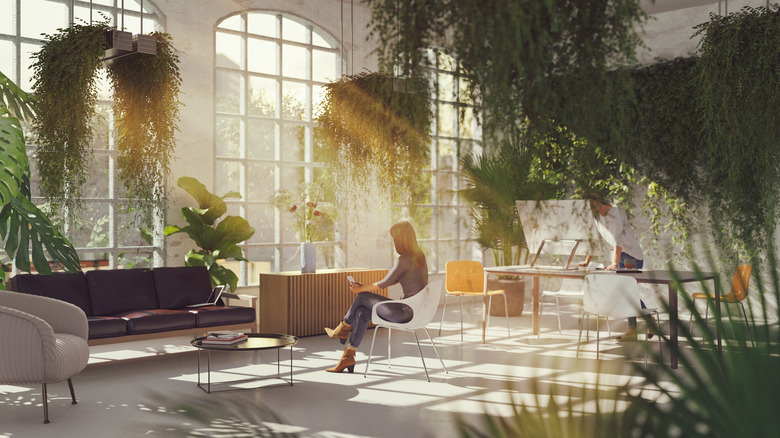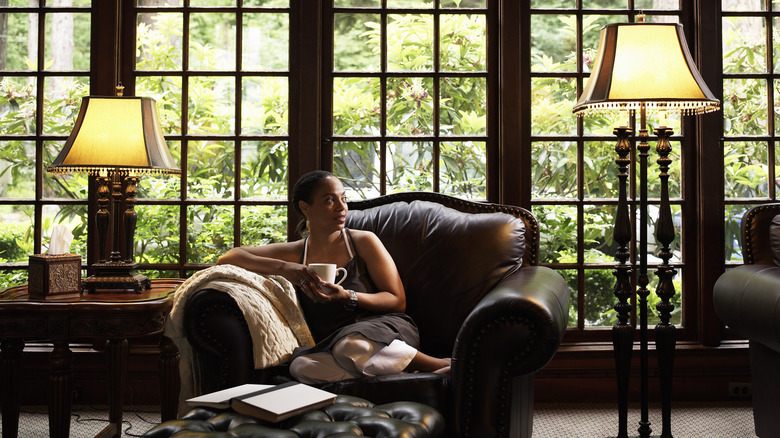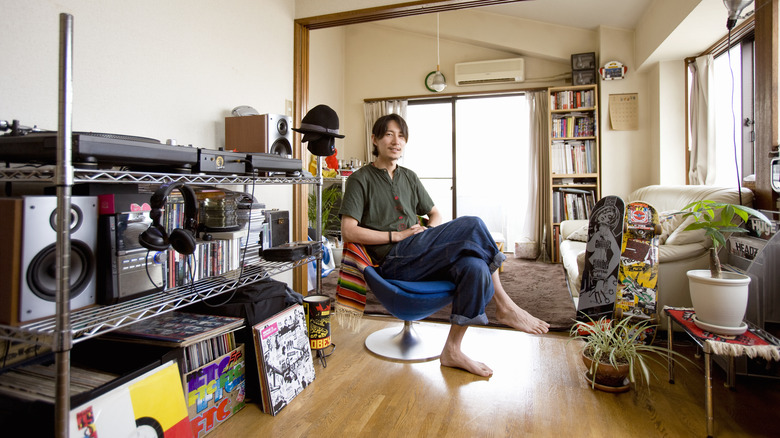The Term We're About To Hear Popping Up More And More With Home Design And Decor
If you look up a list of the expected interior design trends for 2024, you might not see "holistic design" on the list. But you will probably see some of the individual bits and bobs that often make up the holistic approach, like biophilic design, sustainability, and well-being. Holism is about understanding the relationship between parts and the whole, and holistic interior design wants to make you happier and healthier while making the world around you happier and healthier too. Holistic design says all of these things are interconnected, and all of them must be considered if you're making the most of a particular space.
By definition, pretty much anything you can think of will relate to a holistic approach. The important thing is to put all the pieces together in a way that makes sense for the people who occupy that space. That will involve one set of priorities for, say, designing Hurricane Katrina emergency housing and another for refreshing your kitchen. In practice, there are some common principles most designers turn to, like eco-consciousness, promoting physical and mental wellness, integrating natural forms with interiors, applying color psychology, and often some aspects of the slow living home design trend, like focusing on purpose and intention rather than artificial urgency imposed by cultural forces.
Two holistic design camps that could be useful, but sometimes aren't
Those who think about a holistic approach to home design and décor today mostly fall into two camps: academics and practicing designers. Each has a language of its own, and both can be somewhat inscrutable to homeowners. Designers tend to talk about things in either very concrete terms (color choices, minimalism and decluttering, natural light, or how easy things are to clean) or mysterious abstractions like energy flow and bringing good vibes into your home with feng shui. They're prone to reducing holistic design to a checklist of what they believe is important: the bed should be far away from the bedroom door, hide the charging cables, and don't forget the potted plant. But designers work in the rooms where people live, so when they distill holistic design to an oversimplified list, it's probably a useful list.
Academics, on the other hand, describe holistic design in broader terms that are more likely to reflect the principles but aren't always actionable. When Ico Migliore writes in his foreword to "Design and Restoration: A Holistic Approach" that communications technologies are "expanding the scope of innovation from a simple physicality to a new extension of the concepts of limit and material," it's anyone's guess what that means. A refrigerator reminding you to use leftovers? But academics ask some very important big-picture questions like "How should functional or rational use of a space relate to experiential use of that space?"
All design is holistic design ... or should be
Interior design requires both the practical stuff everyone needs to address and the complex philosophical problems everyone also needs to address, even if they don't know it. And because everyone needs that stuff, all interior design should be considered holistic design. The need is self-evident: why on earth would you design a space without taking its bigger context into account, or without thinking about the impact of your color choices on everyone likely to use the space? We think of interior design as an aesthetic pursuit, but it should be multidisciplinary, involving psychology, physiology, ergonomics, ecology, and occasionally swinging a hammer. Without all the contexts and customizations for real needs, you'd basically be designing a dollhouse.
If you're still tempted to separate holistic interior design from plain ol' interior design, ask yourself this: which parts of plain ol' design don't matter? Would a random color suit as well as one chosen for the occupants? Must a chair be comfortable? Is plastic angularity a good style choice for someone with deeply felt ecological concerns? Isn't a lamp as good as a window? The real distinction isn't between regular interior design and holistic design, it's between bad interior design and holistic design. You might be tempted to focus on hygge or feng shui or maybe a particular aesthetic (craftsman, say, or minimalism) ... and you should. Holistic design considers everything that matters, and you can only know if it matters by thinking it through.


